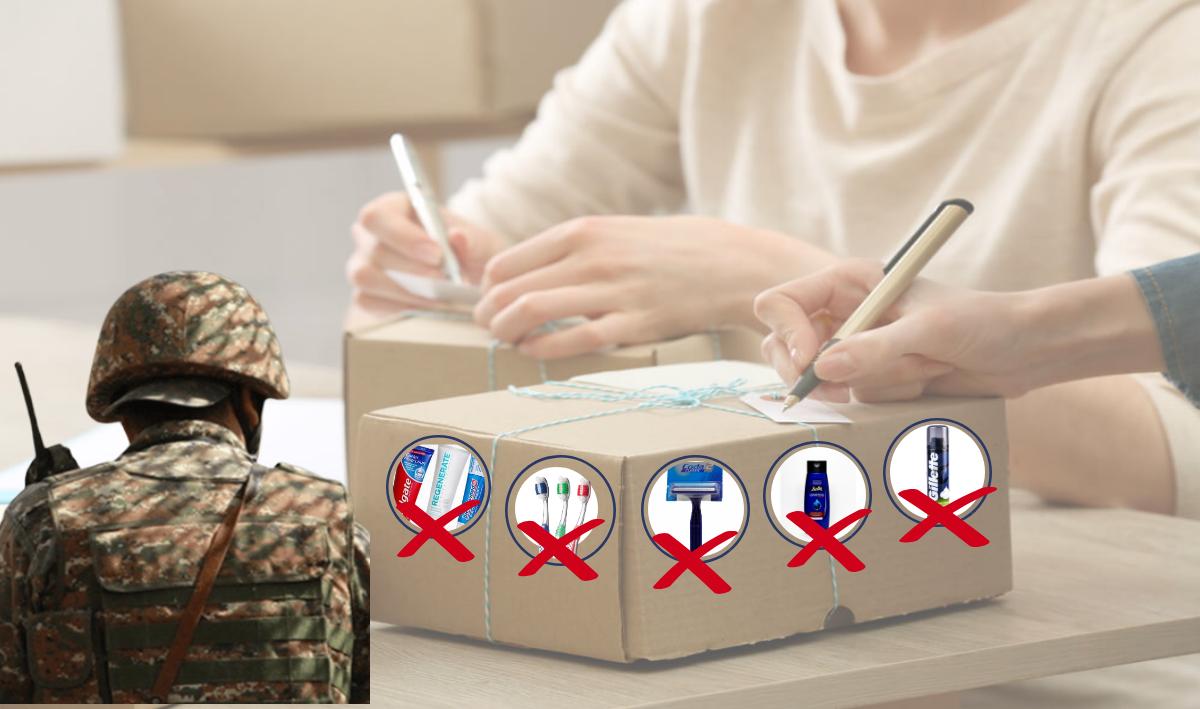
Care Packages from Home: Government Doesn’t Provide Armenian Soldiers a Basic Toiletry Kit
Before sending her son off to compulsory military service, Anahit Grigoryan prepared a parcel of soap, shampoo, toothpaste and toothbrush, and shaving accessories for him to use.
Mrs. Mirzoyan spent 10,000 drams on the items.
It was good that she did, because the army provided none of the above for her son.
“I’ll get a better picture of what going on after the swearing-in ceremony. I am also interested. We’re ready to buy the necessary items again if they officially announce that they cannot afford to provide them,” Mrs. Mirzoyan told Hetq.
Tigran Iskandaryan, discharged from military service this summer, says the army provided him and the other soldiers soap, socks and undergarments during his stint, but that he also received toiletries and other hygienic items every three or four months from home.
Narek Martirosyan, who was discharged in 2017, says the army provided certain toiletries and other items, but for show purposes only.
"We did not use them because we had to present all of the items to our superiors at inspection time," says Narek Martirosyan, adding that the soldiers had to buy what they needed or wait for packages from home.
"We got 3,400 drams per month, and we could buy some stuff. We also shared what we had. Those who didn’t receive packages from home got by,” says the former soldier.
Shipping companies
For many years the families of the military servicemen send parcels to their sons.
It’s a long-held custom in Armenia for families to send parcels of food and toiletries to family members serving in the military.
The parcels are called “tulik”, an anacronym formed by the first letters of the Armenian words for “a parcel full of food sent from home”. These parcels also contain toiletries.
The parcel delivery business is a growing branch of the overall service sector. Delivery organizations operate in a number of Yerevan districts and in provincial capitals, particularly near bus stations.
These shipping services are well advertised.
Rates depend on the weight of the parcel to be shipped. The average weight of parcels sent to servicemen 3-5 kilograms. The rate for one kilogram is 300 drams (63 cents) Parents give the weight to the weighing unit, paste the recipient's data and pay, and the addressee reaches the same day.
What is meant by the term conscript soldier?
Soldiers are sent clothes, hygiene supplies, food, cigarettes and more. Here, we’ll only discuss the hygiene items. And the lack of hygiene items is impossible to fill.
The Ministry of Defense provides servicemen with only hand and laundry soap.
Servicemen do not get toothpaste, a toothbrush, bath accessories, shaving foam, a razor and so on. How soldiers are expected to get by without these items is anybody’s guess.
The amount of government financial assistance to those serving in the military was decreed by Government Decision 1085-N of October 2, 2014.
The average conscript private gets 3,400 drams ($7.10) every month, corporals – 3,600 drams, junior sergeants – 4,000 drams, sergeants – 4,500 drams, senior sergeants – 5,000 drams.
Let’s now see if servicemen can use the money they get to purchase needed hygienic items. By the way, each military post has a small canteen where sundries and other items are sold at higher than market prices.
The minimum basket of hygiene items
Here’s a list of the items not provided soldiers and the prices of each in an average Yerevan store.
Toothpaste 50 ml: 350 - 700 AMD
Toothbrush: 700 - 1,500 AMD
Bath shampoo: 800 - 2,000 AMD
Shaving foam: 850 - 2000 AMD
Disposable razor: 150 - 200 AMD
Aftershave lotion: 1,500 AMD and above
The sum of the minimum prices of these items totals 4,300 drams. This amount is 900 drams more than an average private receives. Many of the items, except for the toothbrush and razor, are frequently shared. For example, one platoon can finish a bottle of shampoo at one shower session.
New government’s approach
In 2018, when Nikol Pashinyan was elected prime minister by the National Assembly, he touched upon the issue of families sending parcels, urging them not to send hygiene supplies to their children. Pashinyan then raised the issue with the Ministry of Defense.
In January 2019, the government announced that soldiers were getting better quality undergarments. In a May 2019, the prime minister declared at a press conference that the clothing issue had been solved and that the government was reviewing the soldier stipend amounts.
Pashinyan publicly stated that servicemen infatuated with the criminal subculture do not hand in their undergarments for communal laundering.
"Many prefer to clean by hand and do not use these washing machines. They don’t want their underwear in the same machine with the underwear of others. It’s a matter of personal dignity," Pashinyan said at the press conference
Pashinyan also announced that after his instructions to the military on the matter, he received information that officers had searched for and confiscated the items sent by the parents of soldiers.
For some reason, the working group established by the Ministry of Defense to study the matter also discussed the issue of banning such parcels.
Fortunately, the group concluded that banning such parcels was a violation of human rights and the fundamental principle of freedom.
Replying to a Hetq inquiry on the matter, the Ministry of Defense wrote:
"The working group, in response to a decree issued by the Minister of Defense, has drafted an outline that defines the order of sending parcels to compulsory military servicemen, checking their contents and handing them over to the military units, as well as a list of permitted items in parcels sent to compulsory military servicemen.”
An expert’s opinion
Karen Vrtanesyan, the site coordinator at Razm.info, believes that the issue of hygiene supplies can be solved with the money provided to the servicemen if the money is directed solely to the solution of those issues.
When asked if the government stipends were sufficient for soldiers to purchase toiletries, etc., Vrtanesyan replied: "If that amount is only spent on those items, it is enough. But because they spend the money to buy other items at the military canteens, maybe it is not enough. I know many people who send the same soap, toothpaste and so on, but it's not as big of a problem as the undergarment matter.”
New government’s approach
In 2018, when Nikol Pashinyan was elected prime minister by the National Assembly, he touched upon the issue of families sending parcels, urging them not to send hygiene supplies to their children. Pashinyan then raised the issue with the Ministry of Defense.
In January 2019, the government announced that soldiers were getting better quality undergarments. In a May 2019, the prime minister declared at a press conference that the clothing issue had been solved and that the government was reviewing the soldier stipend amounts.
Pashinyan publicly stated that servicemen infatuated with the criminal subculture, do not hand in their undergarments for communal laundering.
"Many prefer to clean by hand and do not use these washing machines. They don’t want their underwear in the same machine with the underwear of others. It’s a matter of personal dignity," Pashinyan said at the press conference
Pashinyan also announced that after his instructions to the military on the matter, he received information that officers had searched for and confiscated the items sent by the parents of soldiers.
For some reason, the working group established by the Ministry of Defense to study the matter also discussed the issue of banning such parcels.
Fortunately, the group concluded that banning such parcels was a violation of human rights and the fundamental principle of freedom.
Replying to a Hetq inquiry on the matter, the Ministry of Defense wrote:
"The working group, in response to a decree issued by the Minister of Defense, has drafted an outline that defines the order of sending parcels to compulsory military servicemen, checking their contents and handing them over to the military units, as well as a list of permitted items in parcels sent to compulsory military servicemen.”
An expert’s opinion
Karen Vrtanesyan, the site coordinator at Razm.info, believes that the issue of hygiene supplies can be solved with the money provided to the servicemen if the money is directed solely to the solution of those issues.
When asked if the government stipends were sufficient for soldiers to purchase toiletries, etc., Vrtanesyan replied: "If that amount is only spent on those items, it is enough. But because they spend the money to buy other items at the military canteens, maybe it is not enough. I know many people who send the same soap, toothpaste and so on, but it's not as big of a problem as the undergarment matter.”
Soldier stipends will be increased
In response to our written inquiry, the Ministry of Defense reported that the government's draft decision on amending the government's October 10, 2014 "1085-N" decision has been circulated.
The draft submitted by the Defense Ministry proposes to increase the monthly stipends soldiers in units on the frontline by 2,000 drams. Others will get an increase of 1,000 drams.
The Ministry of Defense has concluded that stipend amounts haven’t changed since 2009 and, given the constantly rising rate of inflation, these amounts won’t be enough to purchase personal hygiene and other essential necessities.
P.S. Only after the adoption of the government decision will it be possible to estimate whether the increases of 1,000 or 2,000 drams are sufficient to solve the problem of hygiene items. Only the soldiers themselves can answer this question.
 Videos
Videos Photos
Photos
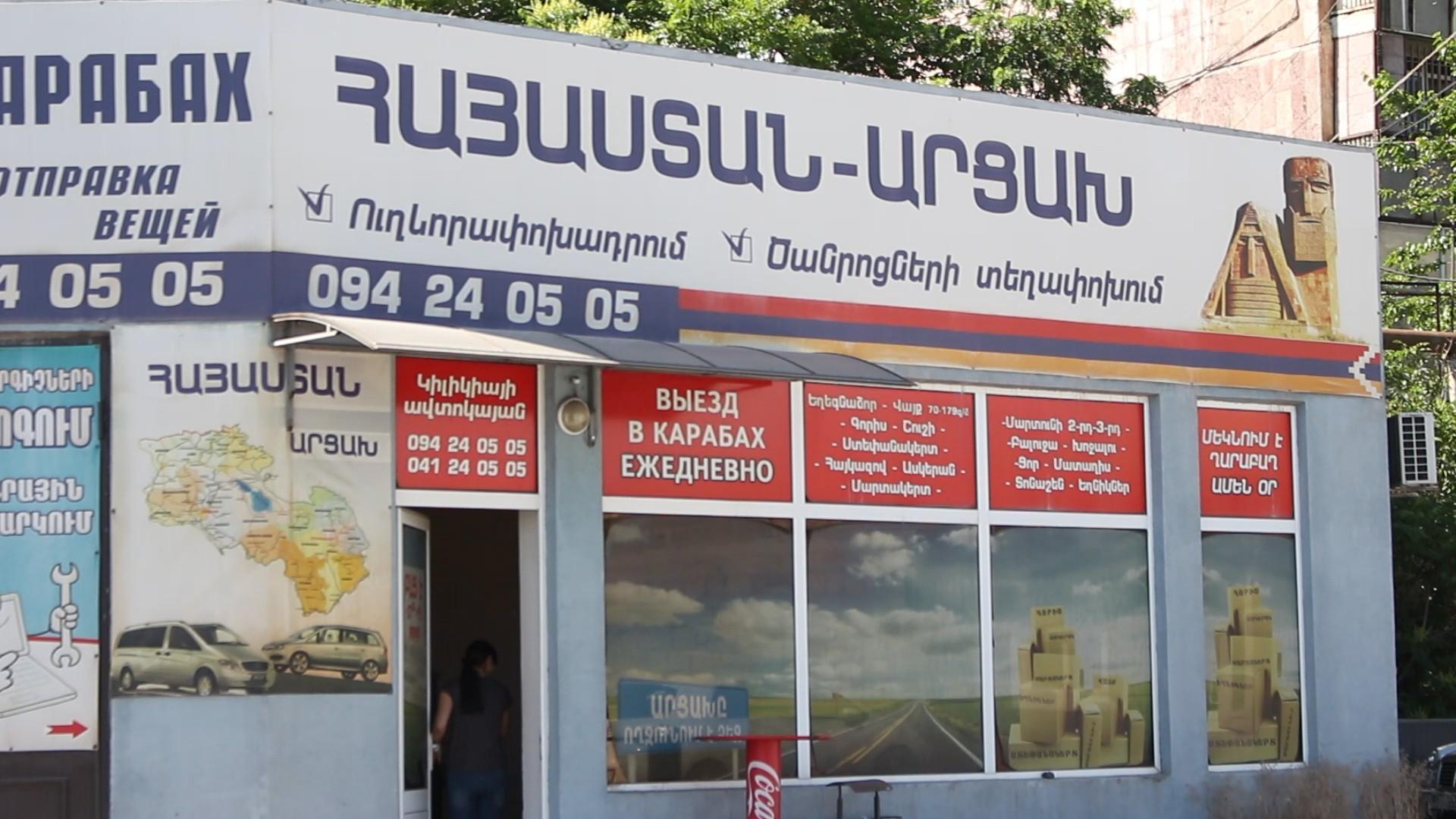
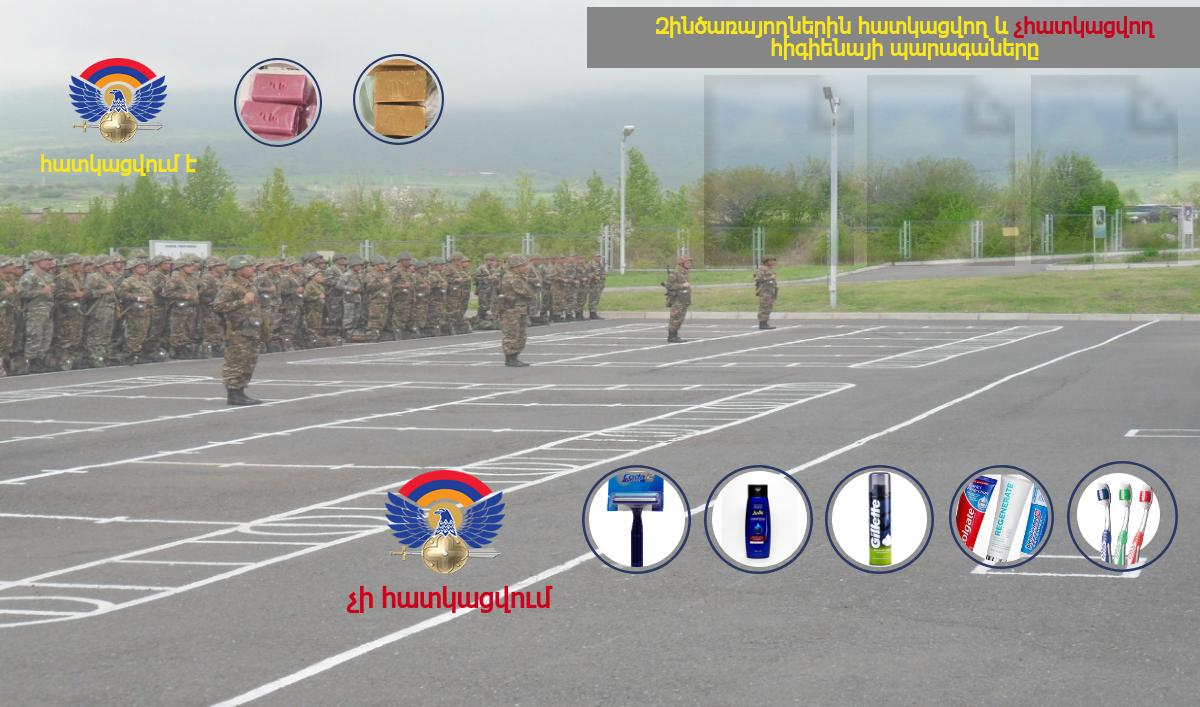
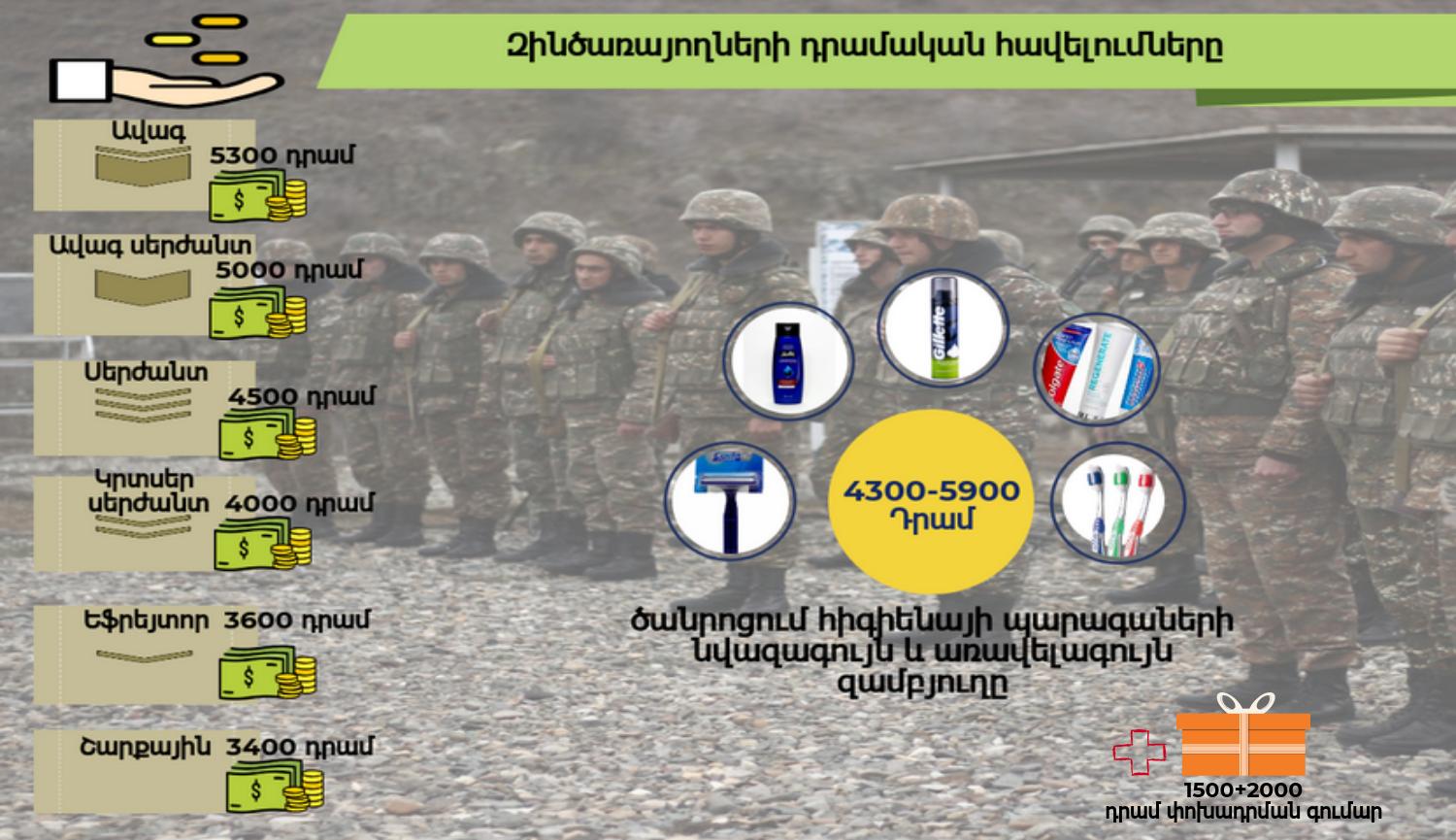
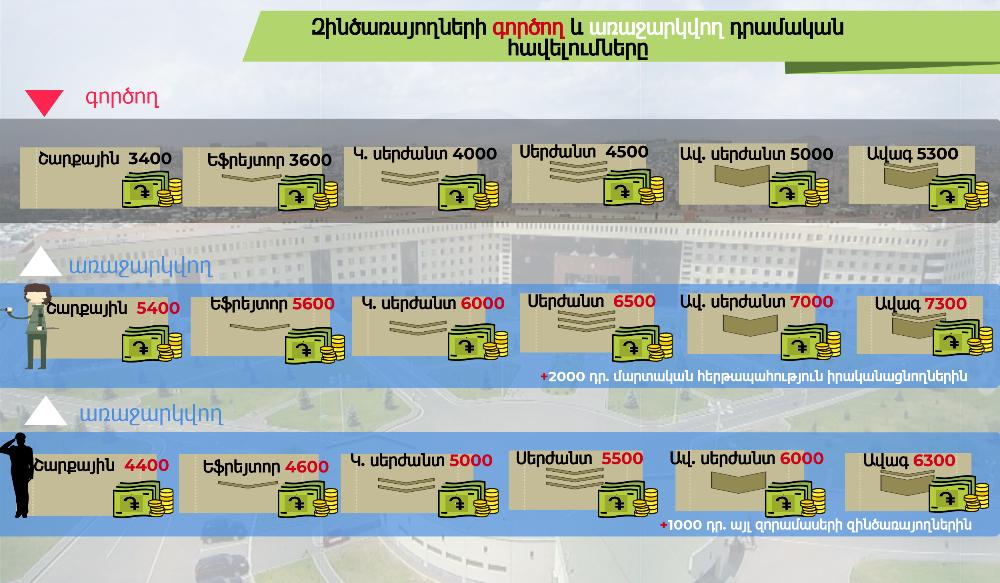
Comments (2)
Write a comment